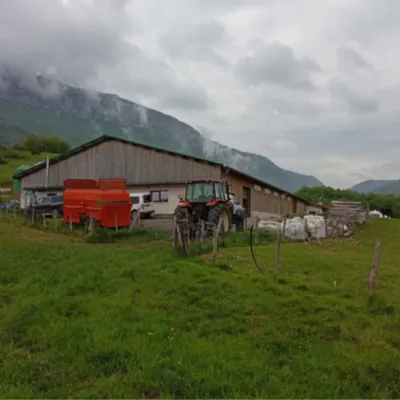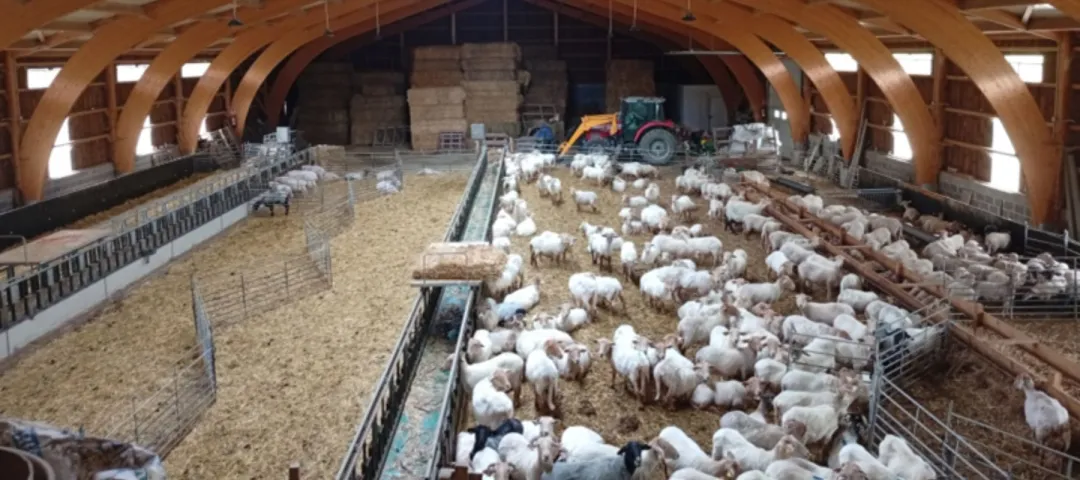General information
RDP Priority
- P2. Competitiveness
RDP Focus Area
- 2B: Entry of skilled/younger farmers
RDP Measure
- M04: Investments in physical assets
- M06: Farm & business development
Beneficiary type
- Young farmer
Summary
A series of CAP-funded investments was initiated by a young livestock farming couple in rural Navarre, Spain, with the aim of building a viable livelihood rooted in sustainable agriculture. Having started with a small flock of Latxa sheep in 2012, the promoters progressively developed their farm into a certified organic operation focused on dairy production. Recognising the opportunity to add value and diversify, they decided to transform their milk into artisan cheese, curd, and yoghurt, produced entirely on-farm.
Supported by EU rural development funds, namely measures for young farmers, agricultural investments, and non-agricultural diversification, the young couple built a barn, a milking parlour, a cheesemaking facility, and a multifunctional space for educational activities.
In addition to modernising production, the farm launched direct sales and agri-tourism experiences, including guided visits and workshops. These activities have helped reconnect consumers with traditional pastoral life and promote awareness of organic farming practices. The project stands as an example of gradual, place-based development with strong community and ecological values.
Results
- The investments in organic Latxa cheese production increased margins, created two part-time sales jobs and strengthened rural value chains.

Promoter
Ohiana Oyarbide Reparaz
Funding
Total budget: 191 718.23 (EUR)
RDP support: 69 006.49 (EUR)
Private/own: 122 711.74 (EUR)
Context
A young couple established a small-scale, semi-extensive sheep farm in rural Navarre, Spain. They began their activity in 2012 with a small flock of Latxa sheep, a native breed that is well adapted to local conditions. Although initially established as a conventional livestock farm, the business transitioned over to organic farming in 2018 and began producing artisan cheese from Latxa sheep milk. The farm was born out of a personal vocation rooted in rural life and a desire to build a sustainable livelihood in their home village.
Supported by the Rural Development Programme (RDP) measures for young farmers and farm investment, the promoters transformed a modest livestock farm into a diversified, multifunctional enterprise. They invested in modern facilities, including a dairy processing area and storage infrastructure.
Beyond cheese production, the couple aimed to reconnect consumers with rural life. They offer guided tours and hands-on workshops showcasing traditional pastoral knowledge and sustainable food production. The project not only supports local agri-food value chains through direct sales but also contributes to rural revitalisation and environmental awareness.
Objectives
The main objective of the project has been to ensure the economic sustainability of a young family farm through the organic production of sheep milk products. Specific objectives were to:
- add value to raw materials by producing and marketing high-quality artisan food products.
- develop direct-to-consumer sales channels.
- raise awareness of rural life and traditional knowledge through guided tours and workshops.
- support environmentally friendly grazing.
- contribute to rural socio-economic vitality and encourage generational renewal.
Activities
Financial support from the RDP measures was used by the young couple to develop their farm. Activities carried out included:
- setting up as young farmers. In 2018, the promoter couple formalised their farming business under a shared ownership model, secured installation aid, and commissioned architectural plans and permits for a new organic dairy unit with INTIA’s (Navarre Institute of Agri-food Technologies and Infrastructures) technical guidance.
- upgrading core infrastructure. In 2018, a 600 m² barn was built to house 250 Latxa ewes, integrating a 12-stall semi-automatic milking parlour, cheese dairy and feed store. Water, electricity and a reinforced concrete floor were installed to ensure biosecurity and year-round animal welfare.
- optimising the pastures. In 2019, the project holders carried out mechanical clearing, reseeding and aeration of 18 ha of meadows. They installed new perimeter fencing to facilitate rotational grazing and protect sensitive riparian zones. This would improve forage quality and reduce reliance on purchased feed.
- purchasing feeding and handling equipment. In 2019, they purchased various items of equipment, including a grain silo with an auger. Additional machinery such as forage wagons, hay rakes, an ewe trailer, mineral dispensers and floor grilles helped streamline operations.
- setting up a dairy. In 2019, they fitted a food-grade processing room and cold store with a 300-litre cheese vat, press, moulds, pH-meter, washer and labelling line. This enabled the on-farm processing of all milk into high-value artisan cheese, curd, and yoghurt.
- setting up a sheep shelter and multifunction hall. In 2020, they constructed an additional sheepfold to provide sheltered lambing, along with an adjacent hall with boilers, toilets and office space. The new facilities would be used for agri-tourism activities and administrative tasks.
- diversifying into agri-tourism. In 2020, they used rural development support for ‘non-agricultural rural business activities’ to launch interactive farm tours and hands-on cheesemaking workshops. Educational materials were co-designed with INTIA, local schools and the municipal tourism office to highlight pastoral heritage and environmental services.
- conducting direct-to-consumer marketing. In 2020, the young couple opened an on-farm shop, joined regional farmers’ markets and partnered with the ‘Km 0 Gastronomy’network.
Main results
- These investments resulted in the establishment and consolidation of an organic dairy sheep farm managed by a young couple in a rural area in Navarra province. 250 Latxa ewes were integrated into a semi-extensive system, supported by modern infrastructure including a new barn, milking parlour, feed storage, and a 300-litre cheese vat. Thus, they enabled on-farm transformation of milk into cheese, curd, and yoghurt.
- Two part-time jobs were created to manage the new facilities, and the family farm was economically stabilised through added value activities and direct sales. While no exact figures were collected on production volume or income increase, the investments marked a shift towards improved processing capacity and local market integration.
- Overall, the investments strengthened the farm’s economic viability, enhanced its ecological management and contributed to rural revitalisation. Future expectations are focused on continuity and consolidation, with no plans for significant expansion, but a strong commitment to long-term sustainability and community engagement.
Key lessons
- One of the lessons learned was the importance of building the farm step by step, beginning with basic facilities and gradually incorporating new elements such as the cheesemaking room, improved equipment and the diversification of activities.
- The promoters stressed the advantage of maintaining a manageable size. Rather than aiming for rapid growth or technological sophistication, they prioritised artisanal quality, ecological standards and direct sales. This approach allowed them to maintain full control over the production process and to remain closely connected to consumers and local markets.
- For others considering a similar initiative, the promoters recommend being realistic about the workload and avoiding overdependence on external labour. They also emphasise the benefits of relying on local advisory bodies, like INTIA, for technical and administrative support. Above all, they advise maintaining a long-term perspective, maintaining a strong connection with the local area, and focusing on what is sustainable for both the farm and the family.
We started step by step: first with a few sheep, then selling milk, and years later we built the cheesemaking room. Everything came little by little, adapting as we moved forward.
It’s a lot of work, and many more hours than a regular job, but we like it, we’re passionate about it, and that makes it all worthwhile.
Ohiana Oyarbide Reparaz

